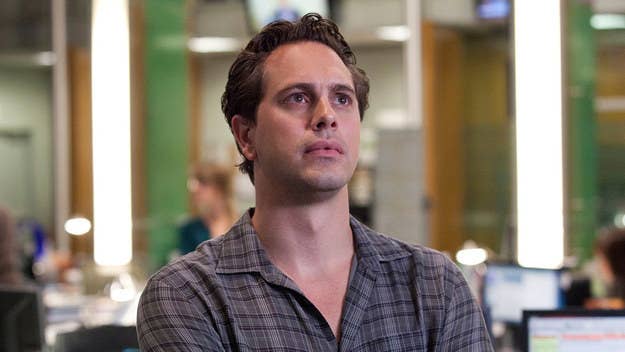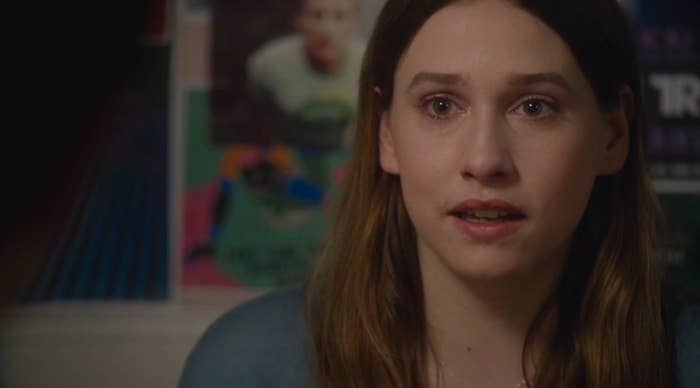
On the Dec. 7 episode of HBO's The Newsroom, Princeton University student Mary (Sarah Sutherland) tells Don (Thomas Sadoski), an executive producer on the fictional news program Right Now With Elliot Hirsch, about how she was raped. He listens to her story, and he tells her that she is credible, that he has spoken to her less-than-credible alleged attacker, who maintains that it was not rape but consensual sex. "I'm obligated to believe the sketchy guy," Don tells Mary. "I believe I'm morally obligated."
The Newsroom, now in its third and final season, has been criticized during its short life for its female characters: They are often silly and incompetent. But this particular morality tale — Don and Mary's conversation is long, and the scene is woven throughout the episode — is The Newsroom's worst instance of woman-hating. And it is a terrible coincidence that the episode is airing the Sunday after Rolling Stone wrote that its reporter had "misplaced" trust (phrasing the magazine later changed) in Jackie, the subject of a long article about her alleged gang rape at the University of Virginia.
Like a good journalist, The Newsroom's Don listens to Mary, who went to the police, though the perpetrators were not punished. Her rape story apparently wasn't good enough to merit further attention. (It's a dangerous misunderstanding on the show's part about the structural insidiousness of campus rape: One of the main problems is that a student like Mary would be discouraged from going to the police in the first place.) With no one to advocate for her, Mary anonymously built a website for herself and other women to — anonymously, if they choose — name their attackers publicly.
Also in the episode, titled "Oh Shenandoah," Will (Jeff Daniels), the anchor and managing editor of News Night, is in jail for not revealing the name of a source. There, Will shares his cell with a prodding foil: a man jailed for domestic battery who complains that he received a harsh punishment because there were "nine women on the jury."
Sitting in a Princeton dorm room, Don tries to convince Mary to take her website down, "to ensure an innocent person isn't destroyed." What about the men, he essentially pleads. One example he offers of the type of person who might post a false allegation on the site is "a woman who feels rejected." And we're meant to be on his side, really. In rape culture, being accused of rape is worse than rape. In rape culture, when we have to decide whose story to believe, it is our moral obligation to believe that the alleged attacker is telling the truth and the alleged victim is a liar.

When Mary tells Don that she went to the authorities and no one helped her, he says, "In fairness, the law wasn't built to serve victims." He continues, "I'm the guy who goes around saying O.J.'s not guilty because a jury said so." It's strange for a journalist to say a jury is the ultimate arbiter of truth, that once the verdict comes down, there are no more questions to be asked. Furthermore, it's a callous thing to say to a woman who just told him that she, like so many rape victims, will never get a trial because her story isn't quite right, because she drank too much tequila, because the accused man says she wanted it — like UVA's Jackie, who went to the administration with a story of gang rape and was offered mediation.
Don's boss wants Mary to come on the show and face off with her alleged attacker. It is horrible to ask a rape victim to be in the same room with her rapist, let alone to "debate" him about the particulars of the trauma. Yet Mary, surprisingly, not only wants to go on the show and confront her attacker, she is eager to do so — Don, who apparently knows what is best for her, urges her not to. "You won't get the justice you're looking for," he says, which is to say, If the system failed you, it's time to shut up.
But Mary doesn't want to shut up. "I'm gonna win this time," she tells him.
There is no winning, of course. Don doesn't want her to tell her story on TV, and so he lies and says that he never found her. He becomes another man who doesn't listen, another man who claims to know what a woman wants better than she knows what she wants, another man who wants a woman's story to go away. And this is because he believes he is "morally obligated" to follow the courtroom tenet, "Innocent until proven guilty," despite the fact that there is no courtroom, there is no judge, there is no sentence coming down; despite the fact that following this tenet requires him to believe that the woman across from him is a liar.
At one point, Don starts to say that Mary's "kind" of rape is difficult to prosecute. "It's not a kind of rape," she shoots back, leading him to backtrack a little ("Sure").
On Friday, Rolling Stone issued an apology to its readers after discrepancies emerged in the facts of the story, "A Rape on Campus," about Jackie. But since it was originally posted, the magazine quietly backtracked on its apology. The words "we have come to the conclusion that our trust in her is misplaced" no longer appear. Instead, the apology now reads, "These mistakes are on Rolling Stone, not on Jackie." Of course, Rolling Stone's Managing Editor Will Dana, whose name appeared at the bottom of the original apology note, didn't mean it like that. But that is exactly how we're meant to think about rape. If it's not the right kind of rape, and if you don't tell your story exactly right, you are probably a liar. If we're following the rules of a society where 1 in 5 women is sexually assaulted, we're obligated to believe the alleged rapist. And if you talk about the crime anonymously — like The Newsroom's Mary and UVA's Jackie — you will also be doxxed as part of your suffering: Don painstakingly (and smugly) lays out to Mary how he found her through his excellent reporting skills that the show fetishizes. (Something even uglier has begun to happen to Jackie.)
At the end of Sunday's episode of The Newsroom, Charlie (Sam Waterston), the head of Atlantis Cable News (ACN) on which Will and Don's shows air, has a heart attack and dies. Mary's story was never important to The Newsroom; it was just a diverting little rape interlude in a bigger story. Nothing to see here.
